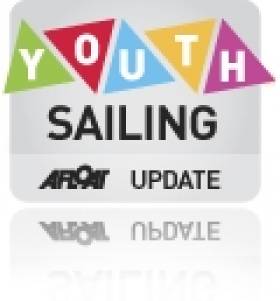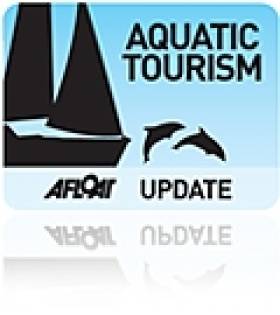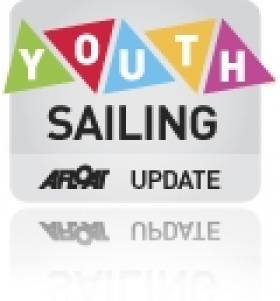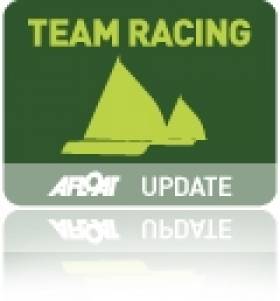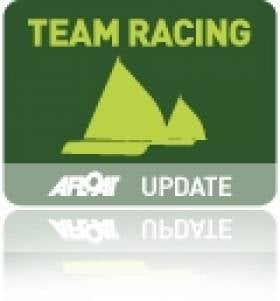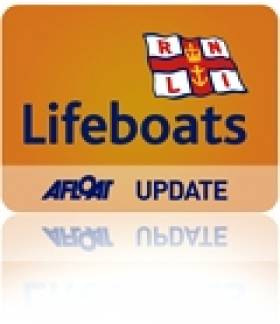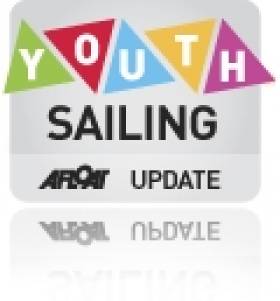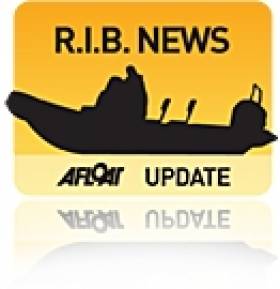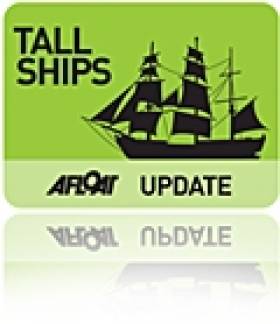Displaying items by tag: School
New Traditional Rig for the Good Ship Ilen
An international gathering at the Ilen School, Roxboro, Limerick of expert marine traditional riggers, sailmakers and classic boatbuilders, might induce one to speculate that a sailing ship is somewhere in Ireland nearing completion. And yes, this gathering of last Friday, clearly marks a significant juncture in the rebuild of Ireland’s 1926 wooden sailing ship Ilen. The way has now been mapped, essential tasks identified, and if rebuilding milestones are achieving, then there is no reason to think that the good ship will not be plying a new trade in Education of the Sea by late summer 2016.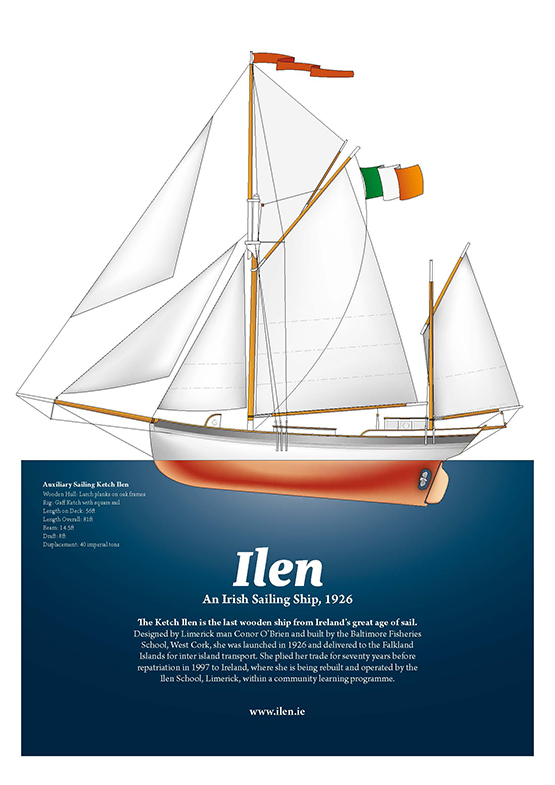
Sutton Dinghy Club Hosts All Ireland Inter-Schools Sailing Event on Dublin Bay
#sdc1940 – Sutton Dinghy Club celebrates its 75th anniversary this year and in the month of September the Sutton Creek club is showing no signs of slowing down. This weekend a total of 95 boats are entered in the 39th All Ireland Inter-Schools Sailing Event. The regatta is being staged the same weekend as the All Ireland Junior Helmsmans Championships in Kinsale.
75 boats are entered in the Suttom Mixed Fleet (PY) championship and and an additional 20 Optimist dinghies in the dedicated Optimist fleet.
There will be almost 150 sailors from schools throughout the country competing against each other in Dart 16, Laser II, 420, Laser Full/Radial/4.7, Mirror, Feva, Topper and Topaz, as well as the Optimist fleet.
This most popular event has seen many schools compete for the coveted trophies over the past thirty-eight years. Each school nominates a Sailing Captain and may enter up to three teams, each team consisting of three (or two) boats, which for the Mixed Fleet may be of mixed class (except Optimists). The best two boat results over the event in each team will count. The members of each team MUST be nominated in advance.
Baltimore Maritime Centre Receives Widespread Support
#westcorksailing – Balitmore Maritime Centre (BMC) was formed in 2013, in order to continue the sailing activities of Les Glénans in Baltimore, West Cork which have ceased. Here BMC chairman Michael O'Meara outlines the work of the centre since it started activities earlier this year.
Both Baltimore and Collanmore sailing bases have been put on the market by Fáilte Ireland. We have been unable to secure a lease on the Baltimore property as Fáilte Ireland are not engaging in that type of business activity anymore. However, we are keeping a watching brief on the sale of Baltimore and there are moves afoot locally to secure funding to make an offer to purchase the base. There has been widespread support for Baltimore Maritime Centre/Glenua in Baltimore and Skibbereen and this is very encouraging looking towards the future. We have ongoing liaison with local businesses and other interests.
On a more practical level, BMC/Glenua, in conjunction with the local maritime heritage group has produced a comprehensive proposal for the development and use of the base. This proposal encompasses traditional boat building, maritime archaeology and a maritime heritage data base whilst ring-fencing and enhancing our Les Glénans style sailing activities. The Baltimore Maritime & Training Project document is reproduced in our newsletter, The Beacon, attached for your information.
We are using this proposal in our engagements with state agencies, politicians and funding agencies. If this proposal is successful, it will give BMC/Glenua security of tenure, enhance the total sailing experience, have the capability of using the base all year round and provide a greater economic unit to make the project sustainable for the long term.
Our fleet of 6 GL 570s were re-located to Heir Island in June in order to provide keel boat courses in a very successful joint venture with John Moore of Heir Island Sailing School. The boats are now back at anchor in Church Strand Bay, Baltimore. More courses will be available during August. We have just completed our July cruising courses running between Kinsale and Baltimore and again, more of these courses will be available during August.
A copy of the BMC newsletter, The Beacon is attached below.
Youth Sailors Brave Chilly Waters at Dun Laoghaire for Sailing School Fun
#inss – There were plenty of thrills and spills in Dun Laoghaire harbour last weekend when local youths took to the chilly February waters as part of the Irish National Sailing School's year round sailing syllabus.
The Irish National Sailing School Junior Club is a way for young sailors to keep sailing during the school terms. Sailors have a choice of sailing either from 10am to 1pm or from 2pm-5pm on Saturdays.
While they primarily sail in dinghies, on the particular cold days children take out fleet of keelboats (1720s and Squibs) allowing them to keep sailing and stay warm in the colder conditions. Sailing on the bigger keelboats also broadens the children's skills and allows them to venture further afield.
Children from as young as 7 are out sailing in the club every Saturday combining the fun and skills of sailing while making new friends and socialising says centre principal Kenneth Rumball. 'There are always plenty of spaces available with new sailors welcome to sign up at any stage', he adds.
The Summer term is running on the following Saturdays February 1, 8, 15, 22 March 1, 8, 15, 22, 29 April 5, 26 May 3, 10. During the 13 weeks children build on their sailing skill and progress through their logbooks to ensure they are learning all the time and gaining extra valuable skills along the way.
For full dates, time and prices see the Junior Club Sailing website
#school team sailing – Racing in the shadow of a gale warning Schull Community College won the Irish Schools Team Racing Championships on home waters at the weekend.
14–teams competed in the event drawn Munster, Leinster, Connaught and two teams from the UK.
Reduced to a one day affair due to 30–knots winds from the south east, the hardy West Cork locals beat visitors Maudlin College (MCS) of Oxford 2-0 in the finals sailed on Saturday afternoon.
Second overall was Presentation College (PBC) in Cork.
Leinster School sailing champions Kilkenny College were third.
Teams were divided into two groups from there ranking at the regional events, with Schull 1, Rochestown College, St Andrews, Schull 2, Gonzaga, Rice College and MCS from the UK in Group 1.
PBC, Kilkenny, Belvedere, Schull 3, Scoil Mhuire, Mt Anville and Morespeed from the UK in Group 2.
Racing took place in 18 of the new team racing boats supplied for the Team Racing Worlds 2011 called the TR 3.6, with little or no breakages.
42 races were run in quick succession with the top two from each group going forward to the Semi Finals and Finals.
In the first Semi Final MCS (UK) were matched against Kilkenny College and the second Semi Final PBC were matched against Schull 1
Kilkenny and PBC matched up for the play off for Silver and Bronze, with PBC taking the Silver 2-1.
Both MCS and Schull were the winners with two wins each and went head to head for the overall result both these teams have meet each other before in two Finals over the last two years at the British Schools Team racing Nationals with one win each, so this was an important final for both teams. Schull came out the winners with two wins, putting them as favourites for the British Schools Nationals in July.
1st Schull Irish National Champions
2nd PBC
3rd Kilkenny
4th Joint/ Rochestown and Belvedere
Overseas Trophy MCS
12 Sailing Schools Line up for Schull's Team Championships
#schoolteamsailing – Current Munster school sailing champions Schull 1 will go head to head with Leinster champions Kilkenny College for the Irish title this weekend when the Irish Schools Sailing (ISSA) Team Racing National Championships takes place in Schull, West Cork. 12 teams have qualified from there regional events with two teams travelling from the UK.
The Fastnet Trophy will be awarded to the first Irish Team Gold, Silver and Bronze medals will be awarded to the first three Irish teams.
The FMOEC Trophy will be awarded to the first overseas Team.
The qualifying teams are:
Schull 1
Schull 2
Schull 3
PBC
Rochestown
Scoil Mhuire
Kilkenny College
Gonzaga
Belvedere
St Andrews College
Mt Anville
Rice
MCS
Morespeed
Download NOR for the event below
Schoolkids Raise €1,300 for Howth RNLI
#RNLI - Children from Scoil Oilibhéir Naofa in Kilcloon, Co Meath yesterday visited the Howth RNLI lifeboat station to present a cheque for €1,300 raised by pupils through a Christmas fair and a 'Chore Tuesday' at their school.
Project teams from the class presented posters and poems about sea safety, the crew kit and the lifeboat. They also met lifeboat station mechanic and crew member Ian Sheridan, who was so impressed by their work that he presented them with a special RNLI flag to hang in their classroom. All of the pupils then had the opportunity to get onboard the inshore lifeboat.
Following a visit to the school by the RNLI Education Team before Christmas, pupils became interested in the lifesaving work carried out by the volunteer lifeboat crews, and were inspired to organise a fundraiser to help save lives at sea.
"The funds raised by the pupils of Scoil Oilibhéir Naofa will go towards our current fundraising project to fund the running and maintenance costs of the lifeboat station for a week," said Howth RNLI fundraising chair Rose Michael.
Welsh Youngsters Learn at Ysgol y Môr (School of the Sea)
youthsailing – Schools from Ynys Môn (Isle of Anglesey) and Gwynedd have won praise from Welsh Government member Ieuan Wyn Jones for spearheading a revolutionary approach to education, which makes the marine environment a key part of learning.
At the Ysgol y Môr (School of the Sea) Race Day 2012, at the Plas Menai National Watersports Centre near Caernarfon, more than 200 children from 13 local schools demonstrated how they have developed their knowledge of subjects ranging from renewable energy technology to marine biology, as well as watersport skills, by taking part in the first initiative of its kind in the UK, being piloted over three years.
Mr Wyn Jones said: "I am very impressed with this pilot project. The schools have clearly got a great deal out of it and I want to work with the Ysgol y Môr team to see how we can develop it further."
Sponsored by nuclear power technology specialists EnergySolutions, who own Magnox Ltd, the day featured an inter-schools regatta of sailing, kayaking and windsurfing races: a marine renewables regatta, run by Engineering Your Future, showcasing pupils' work on solar powered boats, wind and water turbines, and fuel cell technology, culminating in a solar boat race; and a Classe de Mer (Classroom of the Sea) display, showcasing pupils' work on marine wildlife, conservation, maritime culture, history and landmarks on the Menai Strait, ocean sciences, coastal living and dune formation, art and literature.
The event also hosted an Ysgol y Môr Conference for 100 delegates, with Ieuan Wyn Jones AM as keynote speaker, a video about Nautisme en Finistere (Brittany's equivalent of Ysgol y Môr), and presentations by the region's head teachers and an independent assessor on the value of the programme.
Dave Callen, EnergySolutions' Engineering Manager at Magnox Wylfa Power Station, said: "Education is one of the keys to North West Wales' economic and cultural sustainability – and so are the region's marine resources, including energy. We are delighted to sponsor this inspiring event."
Hundreds of youngsters are learning subjects including renewable energy technologies and watersports.
Jon Philips, Director of Stakeholder Relations for the Nuclear Decommissioning Authority (NDA), one of the principal funders of the project, said: "The NDA is delighted to have supported this programme, which we hope will inspire future generations to consider the exciting employment and business opportunities associated with the coastal environment – creating an even more vibrant and exciting place to live and work."
Ysgol y Môr is the first initiative in the UK to use the marine environment as part of mainstream education.
It is modelled on a 30+ year educational programme in Brittany, which has been the driving force behind the growth of the region's highly successful marine industry. It has created major economic development and sustainable jobs, which have helped safeguard the Breton language and culture.
Ysgol y Môr is being piloted in the counties of Gwynedd and Ynys Môn. In the first phase, spanning three years, 1440 pupils from 16 schools are learning watersports skills. 1170 pupils are being taught a range of existing curriculum subjects in classes de mer ('classrooms of the sea'), across both counties.
The launch of Ysgol y Môr followed more than three years of development by North Wales Watersports and its partners. This included a fact finding mission for North Wales educationalists and local authority representatives in 2007 to Brittany, which has 20 dedicated 'classrooms of the sea' centres that have trained thousands of pupils.
The Ysgol y Môr programme is designed as a template for a new national approach to education, based on involving pupils more closely with their local environments, including mountains, forests and urban areas.
New Powerboat School for Dun Laoghaire
#POWERBOAT – Irish National Sailing School (INSS) and Club have announced a new venture in to powerboating. A sister company, the Irish National Powerboat School is providing 'powerboat courses suitable for all levels from novice powerboaters to experienced hands'.
The new company provides courses to a National Powerboat Certificate (Level 2), First Aid & VHF, the Interantional Certificate of Competency as well as 'high octane' powerboat trips around Dublin Bay.
The INSS was established in 1972 and is based at the West Pier, Dun Laoghaire.
The INPS website is here
'Class Afloat' Tall Ship to Visit Belfast Next Week
West Island College International - Class Afloat is one of the world's most unique and interesting educational experiences. It offers high school and university students the opportunity to take fully accredited courses while sailing aboard a traditional fully-rigged class 'A' tall ship built in 1924.
Some facts about Class Afloat:
Created in 1984 as a Canadian International Youth Year programme.
Has visited ports of call on every continent of the world.
Students and staff participate in two service projects in the Dominican Republic and in our West Africa Initiative in Dakar, Senegal
Students tend to come from the top 25th percentile in their home schools and 98% of our students attend the university of their choice after graduating with us
Students spend four hours a day outside of the classroom learning how to run and maintain the ship
Students leave the program having developed strong leadership skills, an ease at working in groups, a sense of responsibility and accountability, ready to participate as an active and conscious citizen.
More on the website here



























